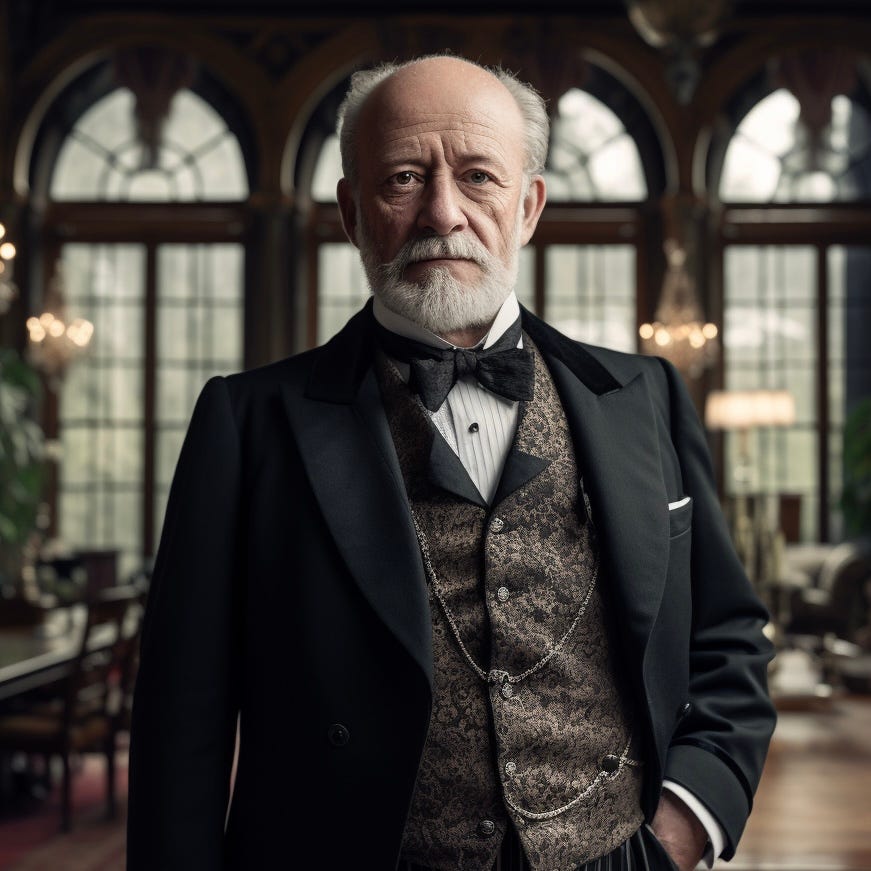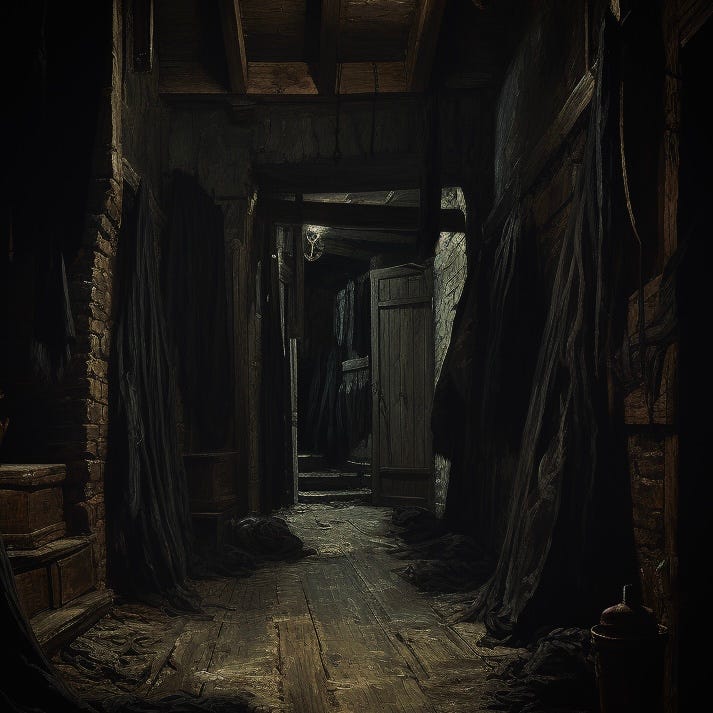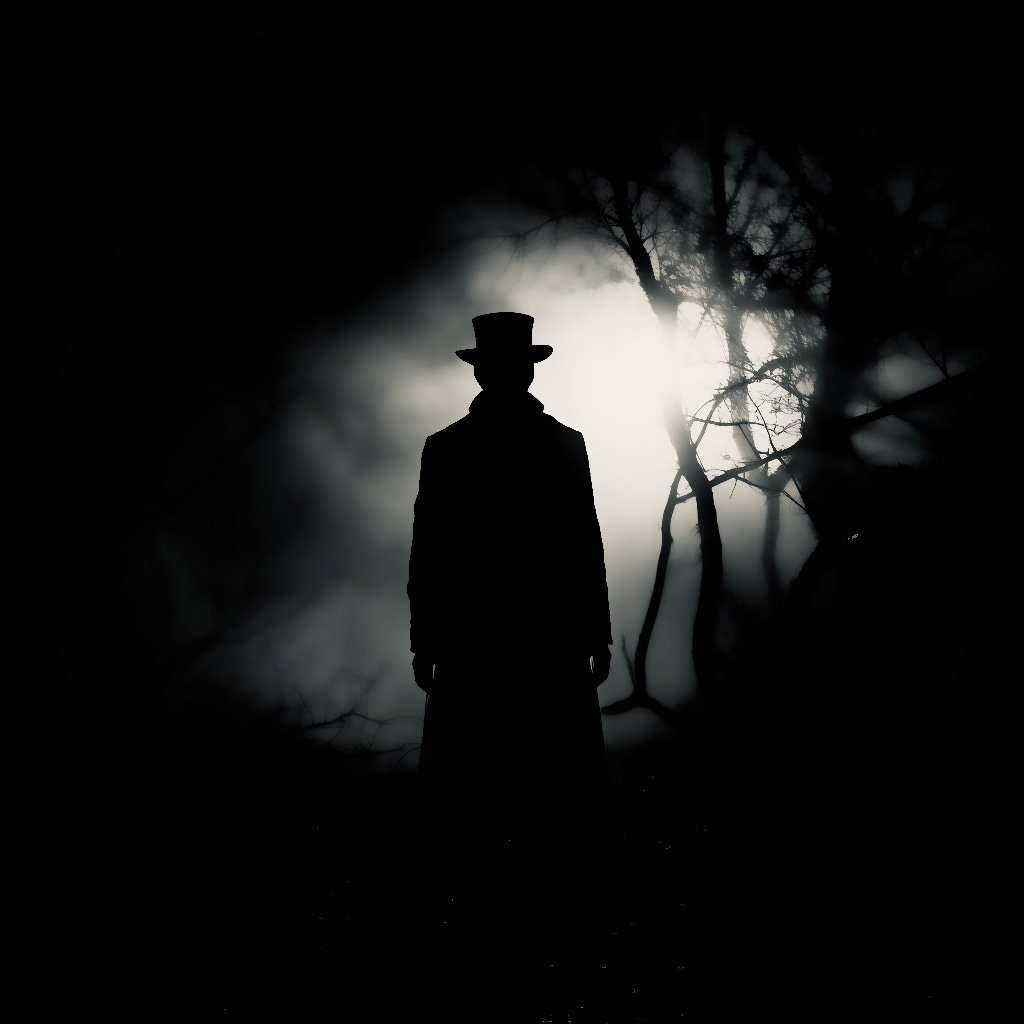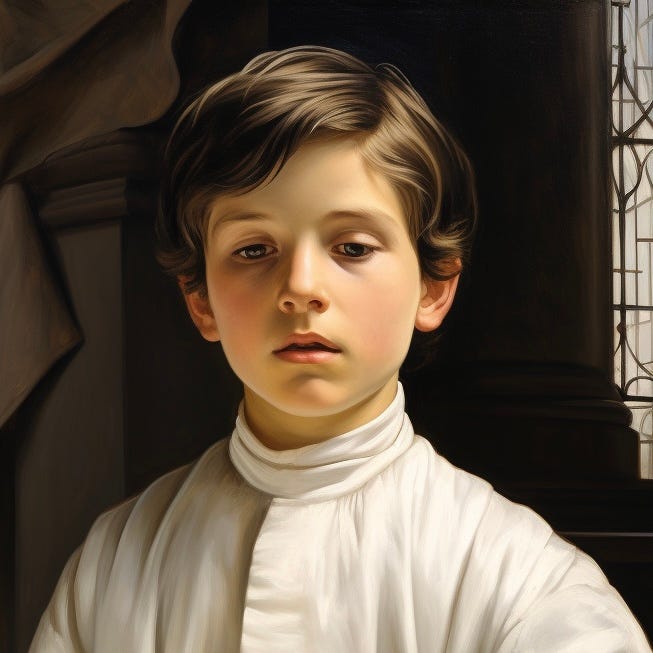Book I, Chapter 8: Palm Sunday
List of Chapters | Previous Chapter
It was late morning, April 1, 1867 (a Monday). The sun’s mellow beams had purged away the dew and mist in the green Westphalian valley, but the Landecker household was in full ferment. For though the previous night’s storm had passed, the terrible events that had attended it were still fresh in everyone’s mind.
Arriving at dawn, the workers learned that, although no wheels were to be produced that day, if they agreed to remain and carry out a series of undisclosed tasks, which had nothing to do with the factory and everything to do with the private interests of its owner, they would not only receive their standard day’s wages but a bonus. However, each man who agreed to stay—and they all did—was sworn to secrecy and threatened with ruinous litigation if he violated his oath.
Maximillian, the foreman, detailed a group of men to the valley to fill Moritz Tischler’s violated grave with concrete and gravel. Three teenage boys, the factory’s youngest employees, were sent as runners to summon the physician, Cronenberg’s justice of the peace, and Oskar, Berthold’s friend and private solicitor.
The doctor arrived first and Ursula conducted him through the dining room and kitchen to the tiled pump room at the back of the mansion, where Hermann sat on a kitchen chair with his trouser legs rolled up and his feet on a stool.
Imogene, the elderly Alsatian maid (who preferred to work alone and in silence), drew water from the pump, mopped the floors, rectified countless mishaps, fetched rags and cleaned the linens as needed. She seemed to be everywhere at once, yet nowhere when called.
Immediately on arrival, Oskar and the justice of the peace (whom Berthold suspected of socialist leanings), went straight to Tischler House where the naked body of the dead groundskeeper, Karl, lay on the wreckage of the four-poster bed. The corpse’s genitals and face were covered by two greasy aprons that Imogene had planned to burn. An hour later, having examined the scene of the crime, Oskar and the justice of the peace entered the pump room through the mansion’s back door.
Oskar was accompanied by a young American from a place called Louisville, Kentucky, who dressed like a dandy and spoke German poorly but with gusto. The tips of his blond hair were curled; his beard was thin and nattily trimmed. He introduced himself as Marty P. Fitzsimmons, Mentalist and Ratiocinative Investigator Extraordinaire (which he pronounced “EX-tra OR di-NAYR”).

He had a tripod slung over one shoulder and gripped a wood handle affixed to a tin tray in his free hand. Hermann’s son, Frank, had evidently been recruited by the man to carry the leather-padded box containing the camera. Marty put the tripod and tray on a long wooden counter in a corner of the room, opposite the water pump and basin. He gestured for Frank to set the box next to these.
With a dramatic flourish he removed a pfennig from his waistcoat and handed it to the perplexed grandson of the millionaire. Then, to the astonishment of everyone, including Imogene, the stranger moved (catlike) around the room with an abstract expression on his face. He gestured to the staircase leading up to the old servants’ quarters. “Where do these steps go?”
Hermann tilted his head and stared into the man’s gray eyes.
Berthold did not know what to make of the vulgar American, so he ignored him altogether. “Karl has been in my employ for over seventeen years. I would never have imagined him capable of such barbarity.—Digging up poor Moritz’s remains, attacking my family. It’s extraordinary.”
“Obviously disturbed,” the justice of the peace commented. “Hydrophobia, I’ll wager.”
“No,” Berthold countered. “The man propped a ladder against the wall, climbed it, smashed the glass with a mallet, and leapt inside. That is malice prépensée, not the acts of a hydrophobic lunatic. He was speaking rationally, even calmly, earlier that day. Hermann can attest to this.”
Hermann nodded, as the doctor tweezed out the last of the glass splinters from his feet.
The justice of the peace spread his arms. “Well, I’ll need to telegraph the Police Federation in Cologne. Bit out of my league, this.”
Berthold appealed to Oskar. “I don’t want a scandal.”
“There won’t be a scandal,” the solicitor assured him with a leer. “I’ll draft up an affidavit in your name and send it over for your signature.”
“Right,” the justice of the peace nodded. “And I’ll seal and authenticate the juratum. Once that’s done, the matter’s closed.”
The doctor washed Hermann’s feet before applying the dressings.
“What about the damages to Tischler House?” Berthold inquired.
Oskar’s brows shot up. “Your property assurance policy is for fires and acts of God, which this most certainly was not. More like an act of the Devil. . .” He emitted a simpering laugh. “I’ll review the clauses concerning flood and water, but I suspect you’ll have to eat this one, Berthold. And since the assailant died with no estate or depository reserves to his name, there is neither person nor entity to lodge a suit against.”
“Damn. And the body?”
“Ah, yes,” the justice of the peace said. “There’s an artillery unit drilling in the Wupperthal before deployment to the French border. I’ll ask their lieutenant to have his men remove the corpse and bury it in the slime pits behind the Cronenberg Tar and Creosote Factory, where the suicides and anonymous dead are dumped.”
The American seemed confused. “What kind of animals do they handle at the factory?”
“What?” Berthold asked, glancing uneasily at Oskar.
Without lifting his eyes from the bandages, the doctor spoke. “He thought you said Tier (animal) instead of Teer (tar).”
Marty slapped his forehead. “Gosh darnit!”
Oskar looked askance at the camera and tripod. “Martin, weren’t you going to photograph the groundskeeper’s cabin?”
“Oh, yes.” He turned to Berthold. “May I have your permission to do that?”
“What for?”
“My investigation.”
“Are you a newspaper man?”
“No.”
“It’s a cabin. Your request is odd.” He turned to Oskar, who shrugged. “But I see no harm in it. . . And my grandson will be with you to ensure you are not an industrial spy.”
When Marty and Frank had gathered up the equipment and departed, Berthold confronted the solicitor. “Who is that man?”
“My niece’s eldest.”
“I see.”
“He’s American.”
“That was never in doubt. What is he doing here?”
“He’s actually quite clever. Intuitive, you know? And I can vouch for his discretion. He’s just spent the last year and a half in Berlin, training the Prussian Police on his techniques and methods.”
“What techniques and methods?” Berthold grimaced.
“He collects and analyzes the ectoplasmic residues of psychical phenomena. . .”
“Oh, good Lord.”
“. . . and practices spirit photography.”
“I’m embarrassed for you, Oskar.”
“Scholars and legists are only now beginning to recognize the reliability of these sciences.”
“Done!” the doctor said.
“So am I.” Berthold glared at the solicitor, then pointed to the bandages on Hermann’s feet. “That is science, because it is useful.”
The doctor rolled down his sleeves. “Wasn’t as bad as it looked. I recommend wearing leather-soled shoes about the house for the next few days. Blood may seep through the gauze.”
Berthold bowed to the men in the room. “Thank you all!” Then he turned to Imogene. “And thank you, Imogene.” The old woman twisted her lips into something between a sneer and a scowl. “I’d like to speak to my son-in-law in private.”
When the assembly had gone, Berthold addressed Hermann. “My boy, you and your family will stay here in the mansion while Tischler House is being renovated. Ursula is having two beds moved into the sewing room for Frank and Charlotte. And you, Henrietta and the baby shall sleep in Ludwig’s old room.”
Hermann stood up. But the lancing pain in his feet, combined with his mental exhaustion, made his head swim. He collapsed into the chair, elbows on the armrest.
Berthold put his hand on Hermann’s shoulder. “You discharged your duties as a father and husband with valor and distinction. But the traumatic events of the last two days have nearly prostrated you. At my bidding, Imogene has prepared a plate of food for you.”
He stepped into the kitchen and returned with a dish of cold wurst and cheese, which he set on Hermann’s lap.
“Don’t look at me like that. I know how seriously you take the Lenten strictures. But there are exemptions for emergencies such as these. I’m certain Father Brückner will hear your confession with sympathy, although I’m not sure how he’ll hear mine, since I’m the one encouraging you to sin.”
Ursula called from the front hall. “Berthold! The workers can’t get the beds into the sewing room! We need the door off its hinges!—NOW!”
“Coming!” Berthold rolled his eyes. “If the door is not removed from its hinges, my wife shall fly off hers.” Before leaving the room, he pointed to the plate of food. “Eat up!”
It was true that he had no energy. But he felt he would vomit if he ate anything now. He was perspiring so profusely, and kept wiping his brow. He set the plate on the low table beside him and brooded. His head lolled to the side and then fell forward. Before he knew what had hit him, he had passed out.
He was only unconscious for a few seconds, but in that time he dreamed the spring rain of the previous night had not yet begun, though the air was damp and cold. He had just stepped to the back of Karl’s cabin, and the gray-eyed American stood at his side. They were facing the clearing where Karl had only just restored Moritz’s body to his coffin. The groundskeeper passed between Hermann and Marty, rifle raised. He was taking aim at a formless shape that flitted over the open grave.
Hermann woke because he heard a latch click upstairs and a door creak. The reverberative thumping of the workers moving furniture made him wonder if his mind had transformed these noises into the click of a latch and creak of a door. He rose from the chair and limped to the base of the steps, gripping the slender wrought-iron rails that ran up either side of the stairwell. He began his ascent, the pads of his feet throbbing, blood oozing through the bandages and staining the pine steps he trod on.
When he reached the top, he saw midway down the corridor that his father’s door stood ajar, a shaft of light falling aslant the cracked, unvarnished wood. The loud stump of his heavy footfalls called to mind the four hooves stomping about the bedroom on the previous night. He held his breath as he rounded the door frame and entered his father’s room. The painting of Our Lady of Mercy gazed smilingly down on Moritz’s deathbed, whose clawed-up mattress and rumpled sheets were drenched in vernal rain.
On the morning of Palm Sunday, Hermann and his family stood with the other parishioners of St Laurentius in Elberfeld at the far end of the cobbled lane leading to the church. Since palms were not common in the boreal north, it was customary to carry willow wands during the procession instead. Hermann accepted a clutch of these from the deacon and distributed them to Berthold, Ursula, and the children. He did not give one to Henrietta, because she was holding the baby.
Ursula tugged Hermann’s sleeve and pointed to the sidewalk where Marty P. Fitzsimmons stood under a haberdashery sign, waving.
“What’s he doing here?” Berthold asked.
Hermann shrugged and walked indolently over to the man, whose suit was too garish for so holy a day. He didn’t want to seem a prig. So he smiled and said, “Blessed day to you, brother.”
Marty addressed Hermann in English. “I see your wounded soles are heeled.—Get it?”
“I don’t speak English.”
“Gosh darnit!. . . Es war ein ‘very’ gut Wortspiel (It was a very good pun).” He held a portfolio, which he now opened. “I have something to show you. I took some photographs down in the valley behind the gardener’s cabin. . .”
“He was a groundskeeper.”
“Oops. Forgot the German word for that. Sorry.” He removed the tissue paper covering the plate. “The workers were busy resealing the grave of the man, Moritz.”
“The man, Moritz, was my father.”
“I know. . . Anyway, Frank, your son—nice kid, by the way—helped me set up my camera, so I could take a photograph from the back of the cabin, facing the clearing.”
“What made you set up the camera at that angle?”
“I think you know why.”
“No, I don’t.”
“I sense things. I don’t know how it works. I just participate.”
Hermann refused to look down at the photographic plate.
“The workers didn’t get out of the way, which is fine by me, because it takes a long time to make a photograph, you know?”
“No, I don’t know. I’ve outgrown toys.”
“Anyway, it was daylight when I took the picture. . . And, well, the thing about this one. . . I mean, the whole medium is still new so it doesn’t alway come out right. But in this plate, it looks like it’s nighttime and the workers can’t be seen at all. And there almost seems to be something hovering over the grave. And I was wondering if you might know—”
Hermann glanced at the photograph and immediately regretted it. The bells of St Laurentius peeled, and Ursula called his name.
“I’m sorry, I can’t help you.” He turned and walked away.
In the photograph a man in a top hat floated over the open grave.
Hermann rejoined his family. The congregants fell in behind the visiting bishop who was leading the procession.
“What did he want?” Henrietta asked.
“Money. He’s a charlatan.”
During the service Hermann tried not to think of what he had seen. He concentrated on the sermon, although much of it was incomprehensible to him because it was in Latin. Every few minutes he and Henrietta knelt on the prie-dieu to pray. He would put his right hand under Henrietta’s arms, because she held the baby.
The pipe organ filled the church with the opening bars of Giovanni Battista Pergolesi’s Stabat Mater. The entire piece was performed that morning. Frank stood in the choir stall, awaiting his solo in the penultimate movement (Quando Corpus Morietur). When the time came, the choirmaster smiled and nodded.
Hermann could no longer restrain his emotions when he heard his son’s voice. Tears coursed down his cheeks. He turned away from Henrietta and Charlotte, both of whom were seated to his right. Ursula leaned forward from the pew behind him. “What’s wrong?”
“I don’t want my daughter to see me like this.”
Berthold overheard and whispered to the man sitting to Hermann’s left; and the message was communicated down the row. The congregants rose to make a way, and the shuffling of their feet on the stone echoed through the church and intruded on the music.
“Where’s Papa going?” he heard Charlotte ask.
“He’s taken ill,” Henrietta replied, trying not to look away from Frank.
When Hermann reached the aisle, he glanced at the choir stall and saw his son lower his eyes.
Outside the church Hermann fled to an ally, where he sobbed and beat the brick wall with his fists.
When the song ended, Henrietta yielded the baby to Ursula and quietly exited the church. She overheard her husband grieving in the crisp morning air. Quietly she went to him in the alley.
“Hermann, what has happened to you?”
“I have to leave Cronenberg. I have to leave you and the children. If I stay. . . ”
She seized his hand. “Don’t say that!”
He shied away.
“Look at me!”
He turned to her, but covered his eyes with one arm.
“Why do we fast?” she asked.
“To commemorate the forty days Our Lord and Savior fasted in the desert, when he was tempted by the Arch Fiend.”
“When a good man is driven to despair, the Devil rejoices.” She drew his arm from his eyes and kissed him. “This too shall pass.”
“No. . . This will never pass.”
“My love, if it is neuralgia or a phantom of the mind, there are doctors in Switzerland who can help you. Your children need you.—I need you!”
Behind him, he heard his father’s voice. “I’m so sorry, son.”
When he turned, Marty Fitzsimmons stood at the end of the alley, portfolio in hand, staring at Hermann with those inscrutable gray eyes. Hermann’s spirit was becalmed. He had ceased to weep.
When Henrietta noticed the man, she positioned herself in front of her husband. “Will you please go away? This is a private matter.”
Marty frowned and turned to leave. But as he walked from the alley, something happened. Hermann had no words for it, because no words were involved. It was as if the young American had telegraphed through the ether a message that seemed to imply that he only wanted to help.













I don't know where you're going with this, but I'm here for the ride!
So good